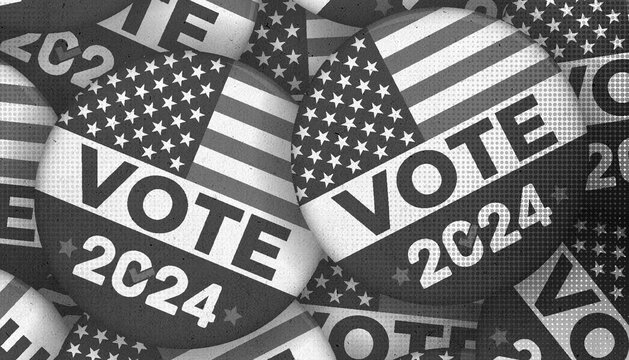Michigan Election Inspectors: Rules and Constraints
Guardrails to ensure that election inspectors cannot disrupt election processes.
Part of
Written and published in partnership with All Voting is Local
Election inspectors (Michigan’s legal term for poll workers) play an essential role in Michigan elections. They perform election duties ranging from processing voters and absentee ballots to securing voting equipment and publishing results. 1 In recent years, Michigan — like other states across the country — has grappled with ongoing election inspector shortages. For elections to function well, it is critical that government officials recruit a sufficient number of qualified individuals from all political parties to serve as election inspectors. It is equally critical, however, that these inspectors perform their duties impartially, follow the law, and not disrupt or interfere with voting and election administration.
In the last election cycle, press reports identified efforts to recruit individuals who promoted falsehoods about Michigan’s election processes as election inspectors. Bad actors outright encouraged prospective election inspectors to engage in improper conduct. And one election inspector faced criminal charges for tampering with an election computer at a voting precinct. To be clear, it would be inappropriate to exclude election inspectors based on their political beliefs. What is equally clear, however, is that state and local officials should take reasonable steps to ensure that applicants are willing to and do, in fact, follow the law and lawful instructions from election officials on Election Day.
Michigan, like other states, already has many guardrails in place to prevent those who seek to undermine elections from qualifying as election inspectors and stop individual election inspectors from disrupting election processes. Indeed, Michigan election officials have long managed election inspectors and developed best practices to keep polling places running smoothly on Election Day. In advance of the 2024 election cycle, this guide details the existing legal and procedural safeguards against election inspector disruptions, along with further actions election officials can take to prevent disruptions
Legal Constraints on Election Inspectors
Eligibility
All applicants, including political party nominees, must submit full and accurate information. State law allows prospective election inspectors to seek appointment in one of two ways: direct application to a county, city, or township clerk or through nomination by the chair of a county’s political party. 2 Each method requires a formal written or electronic application and ultimate approval from the city or township board of election commissioners, which appoints at least three election inspectors per Election Day precinct: one designated chairperson and at least two additional election inspectors. 3 By statute, each application must include the applicant’s name, address, ward and precinct registration, date of birth, political party affiliation, education, employment, and other experience qualifications (e.g., previous election inspector experience). 4 Any false statements made on the application will disqualify the applicant. 5
Applicants must be willing to follow applicable laws and procedures. Before taking office, Michigan law requires that all prospective election inspectors take an oath to ‘“support the constitution of the United States and the constitution of [Michigan], and . . . faithfully discharge the duties of the office of inspector of elections according to the best of [their] ability.’”6 Pursuant to this oath, clerks may refuse to appoint applicants who demonstrate an unwillingness to follow applicable laws and instructions. Clerks should not turn away applicants solely on the basis of their political viewpoints or beliefs so long as they are consistent with laws governing elections. 7
Applicants must meet certain eligibility requirements under Michigan law. State law prohibits individuals from serving as election inspectors if any member of their immediate family is a candidate for nomination or election to any office in the election at issue or if they have been convicted of an election crime or felony. 8 Individuals are further prohibited from serving as an election inspector if they misrepresent their political party preference. 9 At least one election inspector must be from each major political party, to the extent that qualified applicants exist. 10
Election inspectors must receive training. Under state law, the county clerk must hold a mandatory training for all city and township election inspectors within the jurisdiction before the primary and general election. 11
Chain of Command
Election inspectors must answer only to their designated election officials. Election inspectors are employees of the clerk of the city or township in which the election inspector is employed. 12 They serve in an impartial role and must answer to their city or township clerk rather than to their political party or any party official. 13 An election inspector who fails to follow the directions of their city or township clerk may be dismissed by that clerk. 14
Chairpersons oversee certain tasks to create a clear chain of command structure. Michigan’s Election Inspectors’ Procedure Manual tasks chairpersons with specific duties to create a clear chain of command structure among election inspectors. For example, they must supervise any news media recordings, announce the opening and closing of the polls, and help voters who need assistance casting provisional ballots. 15 Chairpersons also may swear in other election inspectors, liaise with the clerk when questions or concerns arise, and ensure that election inspectors from both major political parties are present when required by law, as is detailed below. 16
Following Applicable Laws
Election inspectors are further constrained by their duty to follow applicable local, state, and federal laws; failure to do so violates their oath of office and warrants removal. 17 These applicable laws include, for example, the following constraints:
Election inspectors may not intimidate or harass voters. Federal and state laws prohibit actual or attempted intimidation, threats, or coercion against a voter for the purpose of interfering with, disrupting, or otherwise interrupting their right to vote. 18 Violators are subject to significant criminal and civil liability. 19 Engaging in voter intimidation also violates the election inspector’s oath of office and warrants immediate removal. 20 Indeed, any behavior that disrupts the “peace, regularity and order” at a polling place justifies an inspector’s removal. 21 Examples of prohibited intimidation may include direct confrontation with prospective voters or using insulting, offensive, or threatening language. 22
Election inspectors may not disrupt elections through disinformation. In addition to prohibiting voter intimidation, state law prohibits any behavior that disrupts the peace, regularity, and order of the election process at the polls. 23 Spreading disinformation that disrupts this peace, regularity, and order — including false information about who can vote, how and when they can vote, or other aspects of the election process, including vote counting and registration list maintenance — may therefore violate state law and warrant removal.
Election inspectors may not improperly challenge a voter’s eligibility. Every polling place must have an election inspector designated as a “challenger liaison” to communicate with challengers, who are appointed by political parties and other qualified organizations to observe the electoral process. 24 Unless otherwise specified by the clerk, the chairperson serves as the challenger liaison. 25 The position of election inspector is distinct from the position of challenger; a person cannot be both a challenger and an election inspector in the same election. 26
Instead, election inspectors can make challenges to the challenger liaison only under limited circumstances and with clear constraints. Only four permissible reasons exist to challenge a voter’s eligibility: the person is not registered to vote; the person is less than 18 years of age; the person is not a U.S. citizen; or the person has not lived in the city or township in which they are attempting to vote for 30 or more days prior to the election. 27 The election inspector must provide a specific and permissible reason that they believe the voter is ineligible to cast a ballot and must provide an explanation for that belief. 28 Improper reasons for making a challenge include, but are not limited to, the voter’s manner of dress, inability to read or write English, perceived race, ethnic background, physical or mental disability, support for or opposition to a candidate or political party, or the voter’s need for assistance with the voting process. 29 Any challenge made for the purpose of “annoying or delaying voters” constitutes a misdemeanor offense. 30 Further, improperly challenging a voter is a clear violation of federal law. 31 A challenged voter must be permitted to vote a specially prepared “challenged ballot” provided that the voter’s answers under oath prove they are qualified to vote in the precinct. 32
Election inspectors do not have discretion to determine who can vote and which ballots count. While election inspectors serve as an important safeguard for Election Day voting and tabulation, they have no independent right and no discretion to determine who can vote and which ballots can count, including absentee voter (AV) ballots, other than following the law and instructions of their election jurisdiction. 33 For example, the Michigan Bureau of Elections makes clear that:
- election inspectors must accommodate voters with limited English proficiency and allow them to bring their own translators to a polling location and into the voting booth;34
- election inspectors cannot treat the absence of a physical AV ballot as a reason to not issue the voter an Election Day ballot. Rather, the election inspector must coordinate with the local clerk to confirm that the AV ballot has not been returned and issue the voter a regular ballot, provided the voter is willing to sign an affidavit attesting to the AV ballot being lost or destroyed;35 and
- if a voter submits an AV ballot after inadvertently tearing off the ballot number stub, the ballot should still be counted as a challenged ballot;36 and
- if a voter submits an AV ballot that cannot be read by a tabulator, election inspectors must follow the routine practice of duplicating the ballot so that it can be read by the tabulator. 37
Election inspectors should complete certain tasks in two-person teams. Where possible, state law requires bipartisan teams to conduct certain tasks so as to limit the access that any one individual has to ballots, voting equipment, and other sensitive materials without oversight. 38 This includes the following duties:
- assisting voters who request instruction after entering a voting station;
- opening any electronic tabulating equipment during the day to ensure its proper operation;
- sealing ballot containers, electronic devices, or any other election materials; and
- delivering documents and sealed ballots after the polls close. 39
Election inspectors may not tamper with and/or improperly remove election equipment. It is a felony offense to tamper with and/or improperly remove election equipment; election inspectors must properly secure election equipment after polls close. 40
Available Enforcement Mechanisms
Michigan election officials have broad authority to ensure that elections run smoothly and remain free from disruptions by rogue election inspectors. Available enforcement mechanisms include, for example:
Screening Process. Boards of election commissioners and clerks can refuse to appoint individuals who cannot meet or are unwilling to follow the above eligibility criteria and constraints. 41 They have authority to develop clear election inspector screening plans to ensure that applicants submit complete applications, understand that they must answer to election officials, and are willing to follow all applicable laws and procedures. 42 Applicants may not, however, be turned away based solely on their political viewpoints or beliefs.
Training Content. As noted above, state law requires the county clerk to hold a mandatory training for all city and township election inspectors within the jurisdiction before the primary and general election. 43 At this training, clerks should remind election inspectors about relevant laws and rules, including their duty to answer only to their proper election official chain of command rather than their political parties, any party official, or any other outside individual or entity. 44 Similarly, clerks should train election inspectors to identify and report any violations of these procedures — whether by their fellow election inspectors or other individuals. These training sessions provide an opportunity for clerks to clearly and fully explain the checks in place to prevent voter fraud or manipulation of the election process and provide context to correct common rumors and misperceptions. Hands-on training with voting equipment can be especially helpful for demonstrating security measures.
Assigning chairpersons and inspectors. Given the chairperson’s default role as the challenger liaison and supervisory responsibilities, boards should choose — to the extent possible — to appoint individuals with substantial previous election inspector experience and demonstrated knowledge of voting procedures to serve in this role. 45 Local officials also can track where first-time election inspectors are placed, distribute first-time inspectors evenly across the jurisdiction, and ensure that every precinct has at least one inspector with previous experience.
Dispute resolution. Election inspectors may from time to time disagree over election rules and procedures. Clerks should create a set procedure for reporting disputes up the chain of command to a clerk’s office employee or the clerk directly so they can be quickly resolved. To minimize disruptions to the election process, clerks also can train all election inspectors — especially precinct chairpersons — in effective methods of dispute resolution.
Removal. In the event that an election inspector refuses to follow the chain of command or applicable laws, or otherwise disrupts the election process in violation of their office, that inspector should be immediately removed or reassigned. 46 In case a disruption occurs, clerks should prepare a set removal plan and procedure. This plan could include, for example: (1) a written list of common grounds for removal or reassignment, (2) properly documenting the cause of the removal and all parties involved, and (3) maintaining a list of backup election inspectors to cover staffing shortages in the event the clerk determines that a replacement election inspector is necessary. Clerks can further train and empower chairpersons with the authority to remove election inspectors in emergency situations. 47 If an election inspector is dismissed, they must leave the polling place without disrupting the voting process. 48
Oath of Office. The oath of office provides a strong legal basis for preventing and addressing abuses by election inspectors.
Endnotes
-
1
Mich. Comp. Laws §§ 168.674, 168.677, 168.678, 168.679, 168.682 (1954). -
2
Mich. Comp. Laws §§ 168.673a, 168.677 (1954). -
3
Mich. Comp. Laws §§ 168.674, 168.677 (1954). -
4
Mich. Comp. Laws § 168.677 (1954). -
5
Mich. Comp. Laws § 168.674 (1954). See also, e.g., State of Michigan Election Inspector Application, last updated Aug. 2017, https://www.michigan.gov/-/media/Project/Websites/sos/01vanderroest/Elec_InspecAppl.pdf?rev=2721cebde7534b7fb2d66c9671d543c7. -
6
Mich. Comp. Laws § 168.680 (1954). -
7
See generally, U.S. CONST. amend. I. -
8
Mich. Comp. Laws § 168.677 (1954). -
9
Id. -
10
Id. See also, e.g., White v. Highland Park Election Comm., 878 N.W.2d 491 (Mich. Ct. App. 2015). -
11
Mich. Comp. Laws § 168.683 (1954). Cities or townships with more than 10,000 residents may conduct their own training for election inspectors, in which case those election inspectors do not need to attend the county training. Id. -
12
Michigan Bureau of Elections, “Authority of City and Township Clerks Over Election Inspectors,” last revised Aug. 2022, https://www.michigan.gov/sos/-/media/Project/Websites/sos/Election-Administrators/Clerk-Authority-Over-Election-Inspectors.pdf?rev=32dc06a9b2224745a153c9e3a6d10221&hash=2D4E2F9C56CF3CF1962BF24B934777F5. -
13
Id.; Mich. Comp. Laws § 168.682 (1954) (explaining inspector employment and compensation structure). See also generally Michigan Bureau of Elections, Election Officials’ Manual, Ch. 13: Appointing and Training Election Inspectors, https://www.michigan.gov/sos/-/media/Project/Websites/sos/01mcalpine/XIII_Appointing_and_Training_Election_Inspectors.pdf?rev=78d00339b4634909bd03ea3d8687171f&hash=9744078AD4D258C65AA6F8C0F20F1725 (last updated Feb. 2019); Michigan Bureau of Elections, “Managing Your Precinct on Election Day: Election Inspectors’ Procedure Manual,” Feb. 2024, https://www.michigan.gov/sos/-/media/Project/Websites/sos/Election-Administrators/Managing-Your-Precinct-on-Election-Day-July-2022.pdf?rev=c3f3495746284db4bb85c2a091367905&hash=A8AC1F8E745DB319C4FA008627E56A26. -
14
Michigan Bureau of Elections, “Authority of City and Township Clerks Over Election Inspectors,” last revised Aug. 2022, https://www.michigan.gov/sos/-/media/Project/Websites/sos/Election-Administrators/Clerk-Authority-Over-Election-Inspectors.pdf?rev=32dc06a9b2224745a153c9e3a6d10221&hash=2D4E2F9C56CF3CF1962BF24B934777F5. -
15
Michigan Bureau of Elections, “Managing Your Precinct on Election Day: Election Inspectors’ Procedure Manual,” 4, 6–7, 44, Feb. 2024, https://www.michigan.gov/sos/-/media/Project/Websites/sos/Election-Administrators/Managing-Your-Precinct-on-Election-Day-July-2022.pdf?rev=c3f3495746284db4bb85c2a091367905&hash=A8AC1F8E745DB319C4FA008627E56A26. -
16
See, e.g., City of Midland, Michigan, “Election Inspector Job Descriptions,” https://www.cityofmidlandmi.gov/DocumentCenter/View/25264/Election-Inspector-Job-Descriptions (last visited Mar. 15, 2024); City of St. Clair Shores Michigan, “Election Inspectors”, https://www.scsmi.net/876/Election-Inspectors (last visited Mar. 15, 2024). -
17
Id.; Mich. Comp. Laws § 168.680 (1954). -
18
See, e.g., 52 U.S.C. § 10101(b); 52 U.S.C. § 10307(b); 42 U.S.C. § 1985(3); 18 U.S.C. § 594; Mich. Comp. Laws § 168.932(a) (1954). See also Michigan Bureau of Elections, “Violations of Michigan and Federal Elections Law Relevant to Election Day,” Oct. 19, 2020, https://www.michigan.gov/sos/-/media/Project/Websites/sos/04lehman/Actionable_Election_Day_Offenses.pdf?rev=8cebef1f92d9465486d66f15398dc8b2&hash=4AB5F1DB48EECC2797E4533EF9B0E86E. -
19
Id. -
20
Mich. Comp. Laws § 168.680 (1954). -
21
Mich. Comp. Laws § 168.678 (1954). -
22
See, e.g., U.S. Dep’t of Justice, Federal Law Constraints on Post-Election “Audits” (2021), https://www.justice.gov/opa/press-release/file/1417796/download (explaining federal voter intimidation laws and that intimidation may be in the form of both physical and nonphysical threats); see also Institute for Constitutional Advocacy and Protection, Georgetown Law, Fact Sheet: Protecting Against Voter Intimidation, https://www.law.georgetown.edu/icap/wp-content/uploads/sites/32/2020/10/Voter-Intimidation-Fact-Sheet.pdf (last visited Mar. 15, 2024). Likewise, Michigan law protects election inspectors from such intimidation. Mich. Comp. Laws § 931b (1954). -
23
Mich. Comp. Laws § 168.678 (1954); see also id. § 750.170 (1931). -
24
Michigan Bureau of Elections, The Appointment, Rights, and Duties of Election Challengers and Poll Watchers, 2, 5–6, Mar. 2024, https://www.michigan.gov/sos/-/media/Project/Websites/sos/01vanderroest/SOS_ED_2_CHALLENGERS.pdf. -
25
Id. at 5–6. -
26
Mich. Comp. Laws § 168.730(2) (1954). -
27
Michigan Bureau of Elections, The Appointment, Rights, and Duties of Election Challengers and Poll Watchers, 11–12, Mar. 2024, https://www.michigan.gov/sos/-/media/Project/Websites/sos/01vanderroest/SOS_ED_2_CHALLENGERS.pdf. -
28
Id. at 11–12, 15. -
29
Id. at 12–13. -
30
Mich. Comp. Laws § 168.727(3) (1954). -
31
See 18 U.S.C. § 594; 52 U.S.C. § 20511(1); 18 U.S.C. § 245(b)(1)(A). -
32
Michigan Bureau of Elections, The Appointment, Rights, and Duties of Election Challengers and Poll Watchers, 13–14, Mar. 2024, https://www.michigan.gov/sos/-/media/Project/Websites/sos/01vanderroest/SOS_ED_2_CHALLENGERS.pdf. -
33
Mich. Const. art. II, § 4(1)(f); Mich. Comp. Laws §§ 168.509o, 168.680 (1954). -
34
Michigan Bureau of Elections, Election Officials’ Manual, Ch. 11: Election Day, 14, https://www.michigan.gov/sos/-/media/Project/Websites/sos/01mcalpine/XI_Election_Day_Issues.pdf?rev=55e142f250fe4e76a801c0af77baf0f8&hash=0DEA5AD70BF0A0E5C40A06E4DC088C5F (last updated Feb. 2024). -
35
Michigan Bureau of Elections, Election Officials’ Manual, Ch. 8: Absent Voter Ballot Processing, 24, https://www.michigan.gov/sos/-/media/Project/Websites/sos/01mcalpine/VIII_Absent_Voter_County_Boards.pdf?rev=e01a554b63aa49d1bfeeb4b80ecbd08d&hash=E22E7197C6DC2E7C4E6E651C53632C31 (last updated Feb. 2024); Michigan Bureau of Elections, The Appointment, Rights, and Duties of Election Challengers and Poll Watchers, 16, Mar. 2024, https://www.michigan.gov/sos/-/media/Project/Websites/sos/01vanderroest/SOS_ED_2_CHALLENGERS.pdf. -
36
See Michigan Bureau of Elections, Election Officials’ Manual, Ch. 8: Absent Voter Ballot Processing, 7, https://www.michigan.gov/sos/-/media/Project/Websites/sos/01mcalpine/VIII_Absent_Voter_County_Boards.pdf?rev=e01a554b63aa49d1bfeeb4b80ecbd08d&hash=E22E7197C6DC2E7C4E6E651C53632C31 (last updated Feb. 2024). -
37
Mich. Comp. Laws § 168.798 (1954); see also Michigan Bureau of Elections, Election Officials’ Manual, Ch. 8: Absent Voter Ballot Processing, 12–13, https://www.michigan.gov/sos/-/media/Project/Websites/sos/01mcalpine/VIII_Absent_Voter_County_Boards.pdf?rev=e01a554b63aa49d1bfeeb4b80ecbd08d&hash=E22E7197C6DC2E7C4E6E651C53632C31 (last updated Feb. 2024). -
38
Michigan Bureau of Elections, Election Officials’ Manual, Ch. 11: Election Day, 3, https://www.michigan.gov/sos/-/media/Project/Websites/sos/01mcalpine/XI_Election_Day_Issues.pdf?rev=55e142f250fe4e76a801c0af77baf0f8&hash=0DEA5AD70BF0A0E5C40A06E4DC088C5F (last updated Feb. 2024). -
39
Id. -
40
Mich. Comp. Laws § 168.932 (1954). -
41
Mich. Comp. Laws §§ 168.674, 168.677, 168.683 (1954). -
42
Id. -
43
Mich. Comp. Laws § 168.683 (1954). Cities or townships with more than 10,000 residents may conduct their own training for election inspectors, in which case those election inspectors do not need to attend the county training. Id. -
44
See generally Michigan Bureau of Elections, Election Officials’ Manual, Ch. 13: Appointing and Training Election Inspectors, Inspectors, https://www.michigan.gov/sos/-/media/Project/Websites/sos/01mcalpine/XIII_Appointing_and_Training_Election_Inspectors.pdf?rev=78d00339b4634909bd03ea3d8687171f&hash=9744078AD4D258C65AA6F8C0F20F1725 (last updated Feb. 2019) (providing suggested parameters of trainings). -
45
For an overview of the varied and complex challenges that election inspectors may face, see generally Michigan Bureau of Elections, Election Officials’ Manual, Ch. 11: Election Day, https://www.michigan.gov/sos/-/media/Project/Websites/sos/01mcalpine/XI_Election_Day_Issues.pdf?rev=55e142f250fe4e76a801c0af77baf0f8&hash=0DEA5AD70BF0A0E5C40A06E4DC088C5F (last updated Feb. 2024). -
46
Michigan Bureau of Elections, “Authority of City and Township Clerks Over Election Inspectors,” last revised Aug. 2022, https://www.michigan.gov/sos/-/media/Project/Websites/sos/Election-Administrators/Clerk-Authority-Over-Election-Inspectors.pdf?rev=178db5a60ff6413e994c8858714f4ba1&hash=930A9785C7D217960240C976CD9A0EFA. -
47
Mich. Comp. Laws § 168.678. -
48
Michigan Bureau of Elections, “Authority of City and Township Clerks Over Election Inspectors,” last revised Aug. 2022, https://www.michigan.gov/sos/-/media/Project/Websites/sos/Election-Administrators/Clerk-Authority-Over-Election-Inspectors.pdf?rev=178db5a60ff6413e994c8858714f4ba1&hash=930A9785C7D217960240C976CD9A0EFA.
More from the Poll Worker Rules and Constraints series
-
Nevada Election Board Officers: Rules and Constraints
Guardrails to ensure that Nevada election board officers cannot disrupt election processes. -
Ohio Precinct Election Officials: Rules and Constraints
Guardrails to ensure that Ohio precinct election officials cannot disrupt election processes. -
New Hampshire Poll Workers: Rules and Constraints
Guardrails to ensure that New Hampshire poll workers cannot disrupt election processes.




